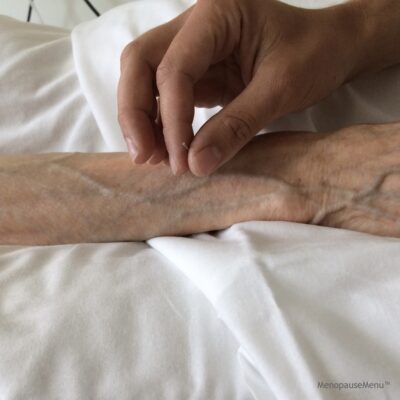MenopauseMenu guest blog post by Kira Baum, ND EAMP from NaturePlunge. As a Naturopathic Doctor (ND) and East Asian Medical Practitioner (EAMP, formerly called Licensed Acupuncturist), Dr. Baum shares her refreshing perspective on managing the transitions around menopause, from a holistic and integrative perspective.
Menopause officially begins when a woman has not had her period for 12 months. But the lead-up to menopause – called perimenopause – can be a much longer and often difficult process.
Perimenopause can start in a woman’s 40s and can last a few months to a decade, with the average being around 4 years. This transition from the reproductive years usually entails much more than just irregular menstrual cycles.
Some of the most common concerns my patients bring up are:
- Weight gain, especially around the middle, despite healthy diets and exercise
- Feelings of anxiety, irritability or sadness
- Increased difficulty sleeping
- Temperature regulation issues
- A foggy brain
- Low libido
Approximately one in every five women will experience very severe symptoms, but almost all women feel some sort of a shift.
One thing to note is that the greater the fluctuation in estradiol levels, the more severe the hot flashes and the higher a woman’s risk for depression. In one study the risk of new depression was almost doubled in women entering perimenopause, compared with premenopausal women.1
These changes can come at a very busy time in a woman’s life. The women in my practice are having children later so it is not uncommon for me to see a woman with small children going through perimenopause and/or balancing a busy professional life. Hormonal fluctuations on top of a busy life can exacerbate feelings of sadness or anger.

There is also a spiritual component at play that often does not get addressed. Many cultures and traditions have rituals to acknowledge some important steps in a woman’s life. In Judaism, there are bat mitzvahs for girls who come into their reproductive years. This week I am helping to plan another rite of passage ritual – a baby shower – for a close friend of mine, pregnant with her first child.
Yet, we do not have a celebration for menopause, an equally important period at the end of the reproductive cycle. In my practice, we begin here by creating a space to think about the meaning of this time and a woman’s dreams for this next chapter.
Although menopause is a natural part of life it does not have to be unpleasant, so we also work to rule out anything that may be exacerbating symptoms. In addition to sometimes checking hormone levels it is important to check thyroid levels as hypothyroidism is often linked with perimenopause. Low vitamin D status and iron deficiency are quite common and could account for feelings of depression and exhaustion.

I also always recommend a course of 6 acupuncture sessions when working with perimenopause as that modality can be especially helpful for hot flashes, sleep and mood fluctuations. I often combine acupuncture with herbal medicine with great results.
Another helpful change to bring in from Asian cultures is the addition of daily soy products such as tofu. These foods contain phytoestrogens (along with flax seeds and several herbs) which can safely help regulate fluctuating estrogen levels.
I also talk about alcohol intake. Many of my patients enjoy wine but, in excess, alcohol can worsen hot flashes, disturb sleep, and impede weight loss.
These dietary tweaks can be quite powerful, especially as part of an organic, high vegetable, whole foods diet.
The combination of acupuncture, herbal medicine, dietary tweaks, and creating space to acknowledge this time of change can all serve to create a smoother and more meaningful perimenopausal transition.

- Cohen L, Soares C, Vitnonis A, Otto M, Harlow B. et al. Risk for new onset of depression during the menopausal transition: the Harvard Study of Moods and Cycles. Arch Gen Psychiatry. 2006;63:385-390.